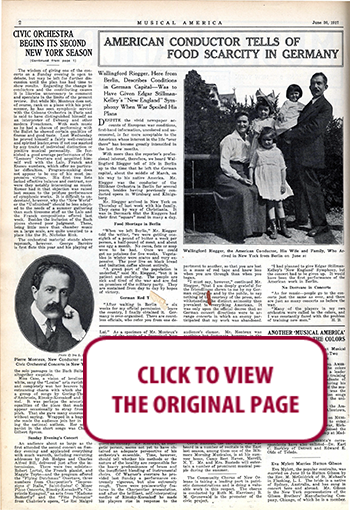 100 YEARS AGO IN MUSICAL AMERICA (201)
100 YEARS AGO IN MUSICAL AMERICA (201)
June 30, 1917
Page 2
AMERICAN CONDUCTOR TELLS OF FOOD SCARCITY IN GERMANY

Wallingford Riegger, Here from Berlin, Describes Conditions in German Capital—Was to Have Given Edgar Stillman-Kelley’s “New England” Symphony When War Spoiled His Plans
DESPITE the vivid newspaper accounts of European war conditions, first-hand information, uncolored and uncensored, is far more acceptable to the American whose interest in the life “over there” has become greatly intensified in the last few months.
With more than the reporter’s professional interest, therefore, we heard Wallingford Riegger tell of life in Berlin up to the time that he left the German capital, about the middle of March, on his way to his native America. Mr. Riegger was the conductor of the Blüthner Orchestra in Berlin for several years, besides having previously conducted opera in Würzburg and Königsberg.
Mr. Riegger arrived in New York on Thursday of last week with his family. They came by way of Christiania. It was in Denmark that the Rieggers had·their first “square” meal in many a day.
Food Shortage in Berlin
“When we left Berlin,” Mr. Riegger told the writer, “we were getting one-eighth of a pound of butter a week per person, a half-pound of meat, and about one egg a month. No cocoa, fats or soap were to be had. Once we could get no potatoes for five weeks. Vegetables in winter were scarce and very expensive. The poor live on black bread and imitation coffee almost entirely.
“A great part of the population is underfed,” said Mr. Riegger, “but it is patient and enduring. The people are sick and tired of the war and are fed on promises of the military party. They are sustained from day to day by hopes of victory.
German Red Tape
“After waiting in Berlin for six weeks for my official permission leave the country, I finally obtained it. Germany is over-organized. There are countless officials, who refer you from one department to another, so that you are lost in a maze of red tape and know less when you are through than when you began.
“I must say, however,” continued Mr. Riegger, “that I am deeply grateful for the friendliness shown to me by my German colleagues and by the public, to say nothing of the courtesy of the press, not-withstanding he distinct animosity then prevalent to everything American. It was only upon the official decree that no·German concert directions were to arrange concerts in which an enemy participated that my work was abandoned.
“I had planned to give Edgar Stillman-Kelley’s ‘New England’ Symphony, but the concert had to be given up. It would have been the first performance of the American work in Berlin.
No Decrease in Concerts
“As for music—people go to the concerts just the same as ever, and there are just as many concerts as before the war. “Many of the players in my own orchestra were called to the colors, and I was constantly faced with the problem of training new men.” —H.B.



 RENT A PHOTO
RENT A PHOTO





